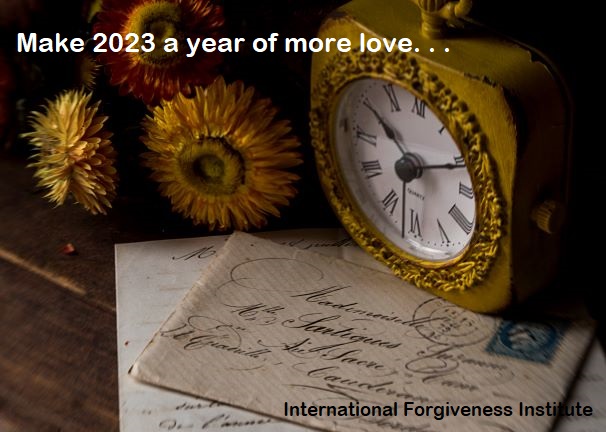Tagged: “Love”
I have a friend who says he “transcends the pain” caused by someone else’s injustice. He thinks this “non-feeling” is the endpoint of what forgiveness is. This kind of “non-feeling” does not seem to be forgiveness in my view. What do you think? Is this forgiveness?
Because forgiveness is a process, a person who forgives can move from hatred, to some anger, to very little or no anger. Yet, there is more to the process of forgiveness and this includes moving toward the moral virtue of goodness that includes positive thoughts, feelings, and behaviors toward the one who offended. If your friend thinks that the endpoint of forgiveness is “non-feeling,” then this person is not understanding what the endpoint of forgiveness is. On the other hand, if this person knows the endpoint and is not there yet, then the person definitely is on the path of what forgiveness actually is in its essence.
I am a parent with a child who is angry. This started when my husband divorced me. I say my child is angry because of rather quick temper tantrums. Yet, when I talk with him about his anger, he is in denial, telling me that he has no anger. What advice do you have for me to begin helping him to see that, indeed, he is angry, actually quite angry?
First, I think you need patience with your child. He is deeply hurt because of the divorce. I say that because you say his temper tantrums began in the context of the divorce. Rather than discussing his anger, I recommend that you gently talk with him about his wounded heart. Give him time to see that he is deeply hurt by his father leaving. Once he can see this, then talking about forgiveness is a next step. Once your child has the safety-net of forgiveness (that can lessen hurt and anger), he then likely will be open to seeing that he is angry and that there is a solution to it–forgiveness.
Your Unfolding Love Story for 2023
In March of 2014, we posted a reflection here in which we encouraged you to grow in love as your legacy of 2014. The challenge was this: Give love away as your legacy of 2014. We challenged you again in 2015…..and 2016……and we kept going.
Our challenge to you now is this: Give love away as your legacy of 2023.
One way to start is by looking backward at one incident of 2022. Please think of one incident with one person in which you were loved unconditionally, perhaps even surprised by a partner or a parent or a caring colleague.
Think of your reaction when you felt love coming from the other and you felt love in your heart and the other saw it in your eyes. What was said? How were you affirmed for whom you are, not necessarily for something you did? What was the other’s heart like, and yours?

(Image by StockSnap.io)
Can you list some specific, concrete ways in which you have chosen love over indifference? Love over annoyance? If so, what are those specifics and how are they loving? When it is January 1, 2024, and you look back on the year 2023, what will you see? Now is your chance to put more love in the world.
As one commitment to that love as expressed through forgiveness, you might consider signing our Forgiveness Pledge here: https://internationalforgiveness.com/forgiveness-pledge/
Tempus fugit. Your good will, free will, and strong will can point to a year of more love…..and the clock is ticking.
![]()
I am a survivor of sexual abuse by my father, who is a pedophile. While I have healed fairly well from this (through therapy, medication, etc.), and pray every day to forgive him, I often struggle with feeling guilty over not visiting him at the nursing home where he currently resides. I pray every day for him, and sincerely do not wish harm to him. I fear that if I don’t visit him, I am not fulfilling Christ’s commandment to forgive him. Yet, I fear that visiting him might bring up some painful psychological memories, might put me back into a brief depressive/anxious state, and could lead me to an episode of Atrial Fibriliation (which for me seems to be provoked in times of extreme stress). A sibling of mine has been trying to get me to go visit my dad, and is of the belief that if we don’t visit him (“I was lonely and you visited me”, from Matthew 25), we might go to hell. Any wisdom you can share?
A key issue here is this: You are thinking that to truly forgive your father, then you must visit him in the nursing home. Further, you believe that if you do not visit him, you are disobeying Christ’s commandment to forgive him. Here is my view: To forgive is a process that unfolds over time as we work on that process of forgiveness. You are working on this process of forgiveness by: a) praying every day for the grace to forgive him; b) praying for your father; and c) wishing no harm to him. All of these are part of the forgiveness process in your case as a Christian. You need not reach complete forgiveness right now in that you have to behaviorally reach out to your father with a visit. I say this for this reason: Your **intentions** toward your father are good in that you pray for him and wish no harm to him. Further, your reason for not visiting him is honorable in that you need to protect your cardiac system. In other words, if your intention for not visiting your father in the nursing home is to punish him, then this would indicate that you are not yet forgiving. This is not the case for you. You have a good reason for not visiting right now because you have to protect your health. If, in the future, you think you are open to such a visit and, at the same time, you truly believe that your physical and emotional health are protected as you visit, then you could re-think your current decision. For now, I see no bad intentions at all on your part and so please keep praying for your father and for the grace to forgive and go in peace knowing you are doing the best that you can under the circumstances.
Forbes: Forgiveness has “Immense Benefits”
Forbes Magazine is undeniably one of the most highly read news publications in the world. With 49 global editions licensed in 83 countries and printed in 28 languages, it reaches more than 140 million people worldwide on a monthly basis through direct subscription and its website.
Now the 105-year-old publication has teamed up with medical experts to tout the “immense benefits” of forgiveness on both mental and physical health in an article titled “Forgiveness: How to Forgive Yourself and Others.” It was published on Aug. 31, 2022, and received the coveted Forbes Health Advisory Board seal of approval.

“The benefits of forgiveness greatly outweigh holding a grudge, and can affect both mental and physical health in profound ways,” according to the article. “While forgiveness may feel impossible in certain circumstances, forgiveness experts—yes, this is a real field of study—say that forgiveness can be learned no matter how great the offense. Even if the person you have the hardest time forgiving is yourself, this too, they say, can be learned.”
The Forbes article relies extensively on the work of Dr. Robert Enright and calls him “a pioneer in the scientific study of forgiveness” and “a leading expert on forgiveness.” Dr. Enright is a professor of educational psychology at the University of Wisconsin-Madison and co-founder of the International Forgiveness Institute who last year was awarded the 2022 American Psychological Foundation Gold Medal Award for Impact in Psychology.
“As you can see, all the ways of practicing forgiveness as well as its benefits aren’t really about the person who wronged you; it’s about yourself,” according to the Forbes article. “Forgiveness isn’t easy, but it can be done. When you commit to putting it into practice, your mental and physical health will both be better for it.”
“Clearly forgiveness has immense benefits.”
Forbes Magazine
Here are the scientifically-demonstrated benefits of forgiveness cited in the article:
Mental Benefits of Practicing Forgiveness
- You experience less anxiety when you forgive
- Inability to forgive and depression can be linked
- You feel more hopeful and empowered when you forgive
- You’re less likely to hurt others
Physical Benefits of Practicing Forgiveness
- Forgiveness is good for your heart
- It’s associated with better sleep
- Forgiving supports the immune system
In addition to lauding the benefits of forgiveness, the article includes a helpful list of “10 Ways to Practice Forgiveness for Yourself and Others.”
Read the full Forbes Magazine article.



